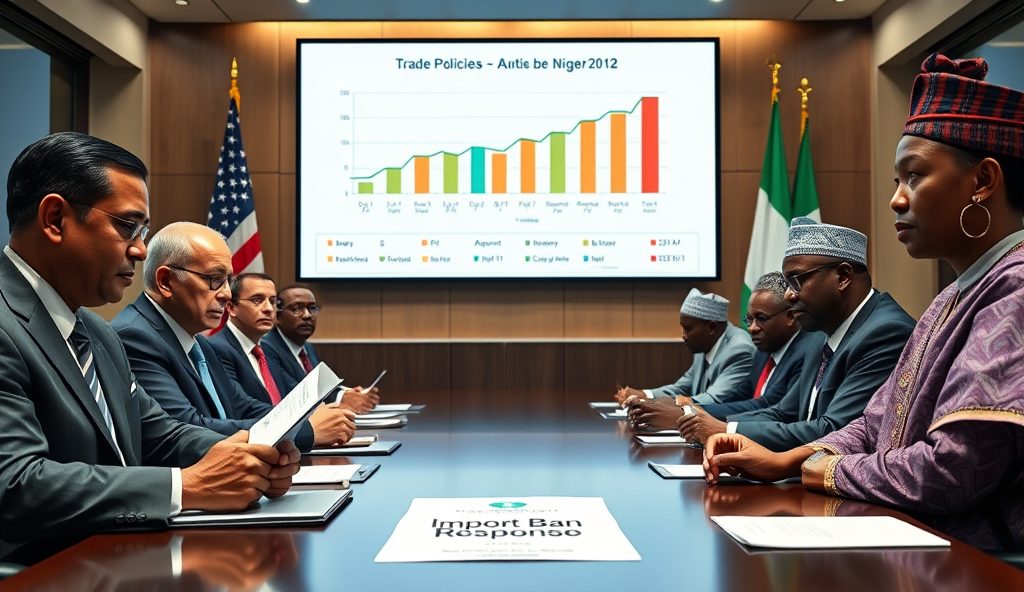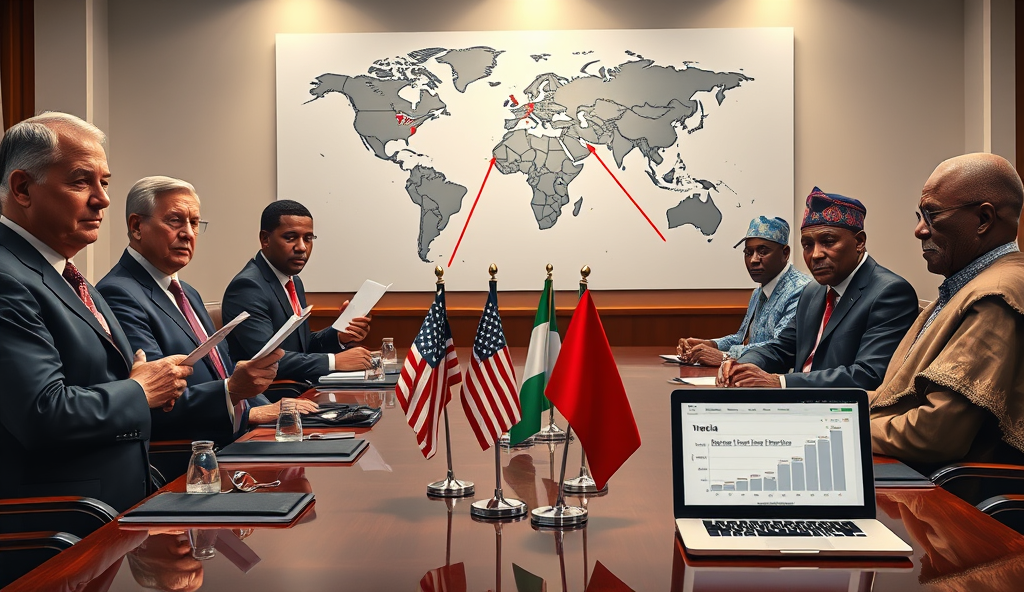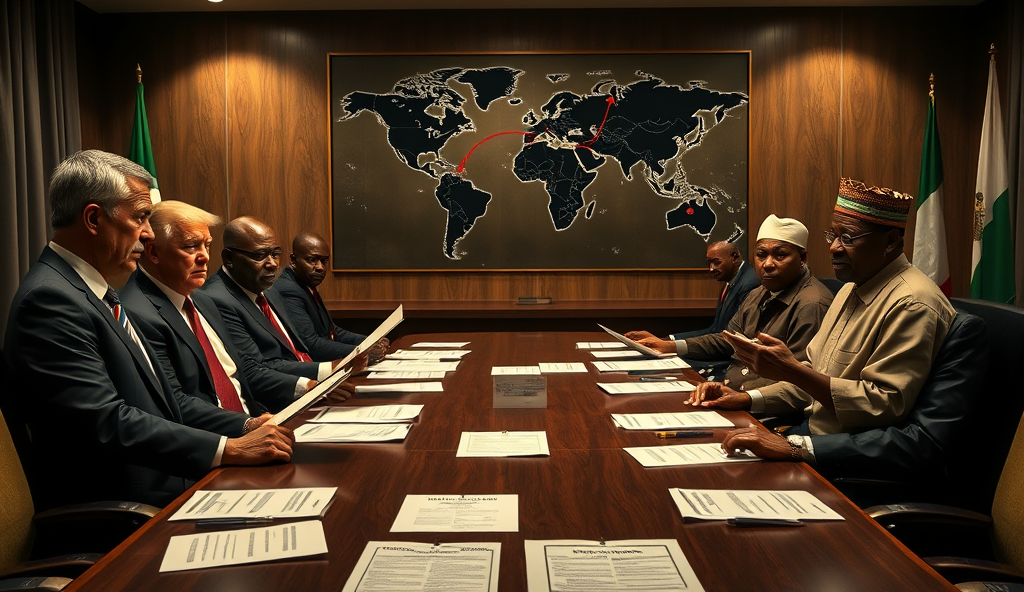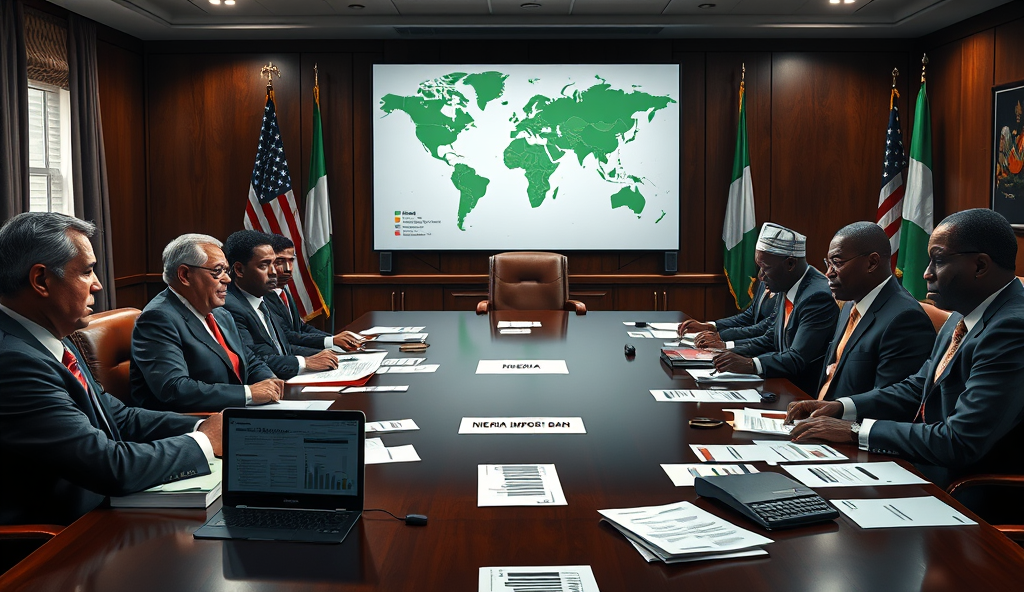Introduction to Nigeria’s recent import ban policies and their global implications
Nigeria’s recent import ban policies represent a strategic shift in the nation’s economic policy, aimed at boosting local production and reducing dependency on foreign goods. The Central Bank of Nigeria (CBN) has restricted access to foreign exchange for importing items such as rice, cement, and textiles, which can be produced domestically.
This move aligns with the federal government’s broader agenda under the Economic Recovery and Growth Plan (ERGP) to diversify the economy away from oil revenues. According to data from the National Bureau of Statistics (NBS), Nigeria’s import bill dropped by 12.7% in the first quarter of 2023 following these restrictions.
However, the policy has sparked mixed reactions globally, particularly among trading partners like the United States, which exports significant quantities of agricultural products to Nigeria.
The global implications of Nigeria’s import ban are multifaceted, affecting trade balances, diplomatic relations, and supply chains. For instance, the US reaction to Nigeria’s import restrictions has been closely monitored, given that Nigeria is one of the largest markets for American agricultural exports in Sub-Saharan Africa.
In 2022 alone, the US exported over $1.3 billion worth of goods to Nigeria, including wheat, machinery, and consumer products. The ban has disrupted these trade flows, prompting concerns among US exporters affected by Nigeria’s import restrictions.
Additionally, international organizations like the World Trade Organization (WTO) have raised questions about the compliance of these measures with global trade rules, adding another layer of complexity to the situation.
From a domestic perspective, the import ban has had both positive and negative outcomes for Nigeria’s economy. On one hand, local industries such as rice farming and textile manufacturing have seen a resurgence, with production increasing by 18% and 22%, respectively, since the policy’s implementation.
On the other hand, critics argue that the sudden restrictions have led to shortages and price hikes for certain goods, disproportionately affecting low-income households. For example, the price of rice—a staple food—rose by 30% in urban areas within six months of the ban.
These unintended consequences highlight the delicate balance policymakers must strike between protecting local industries and ensuring affordability for consumers.
The diplomatic ramifications of Nigeria’s import ban extend beyond trade, influencing geopolitical alliances and negotiations. The US government stance on Nigeria’s import policy has been cautious but firm, with officials emphasizing the need for dialogue to address trade imbalances.
During a recent visit to Abuja, US Trade Representative Katherine Tai underscored the importance of maintaining open markets while acknowledging Nigeria’s right to pursue economic self-sufficiency. This nuanced approach reflects broader tensions in Nigeria-US trade relations after the import ban, where both nations seek to protect their interests without escalating into a full-blown trade dispute.
Similar dynamics are playing out with other key partners, such as China and the European Union, which are also reassessing their trade strategies with Nigeria.
As Nigeria navigates the complexities of its import ban policies, the global community watches closely to gauge their long-term impact. The next section will delve into the historical context of US-Nigeria trade relations before these restrictions were imposed, providing a foundation for understanding how recent developments have reshaped bilateral ties.
This historical overview will shed light on the evolution of trade patterns, key agreements, and mutual dependencies that have defined the relationship between the two nations. By examining these factors, we can better appreciate the significance of current tensions and potential pathways for resolution.
Key Statistics

Overview of the US-Nigeria trade relationship before the import ban
Nigeria's import ban policies represent a strategic shift in the nation's economic policy aimed at boosting local production and reducing dependency on foreign goods.
The US-Nigeria trade relationship has historically been shaped by Nigeria’s reliance on imports of key commodities and the US’s position as a leading supplier of agricultural and manufactured goods. Prior to the import ban, bilateral trade between the two nations averaged $6.3 billion annually from 2018 to 2022, with Nigeria importing approximately $3.1 billion worth of US goods each year.
Agricultural products like wheat, rice, and poultry accounted for nearly 40% of these imports, reflecting Nigeria’s persistent food security challenges and limited domestic production capacity. The US also exported machinery, vehicles, and petroleum products, which supported Nigeria’s industrial and energy sectors.
This trade dynamic created a degree of economic interdependence, with Nigeria relying on US exports to meet critical needs while the US benefited from access to Africa’s largest consumer market.
A key pillar of pre-ban trade relations was the African Growth and Opportunity Act (AGOA), which granted Nigeria duty-free access to the US market for over 6,500 products. While Nigeria primarily exported crude oil under AGOA, the agreement fostered broader economic ties and encouraged US investment in sectors like agriculture and manufacturing.
Data from the US International Trade Commission shows that AGOA-related trade between both countries grew by 8% annually before the import restrictions took effect. However, this growth was uneven, with Nigeria’s non-oil exports to the US remaining below potential due to capacity constraints and quality standardization issues.
The imbalance became a growing concern for Nigerian policymakers seeking to diversify export revenue streams beyond hydrocarbons.
Energy trade formed another critical component of the relationship, with Nigeria supplying 5% of US crude oil imports at its peak in 2014. Although this share declined to about 2% by 2022 due to the US shale boom, energy cooperation continued through technology transfers and joint ventures between American oil companies and Nigerian firms.
The US remained Nigeria’s largest foreign investor in the oil sector, with ExxonMobil, Chevron, and other firms operating major offshore assets. This energy partnership created a complex web of economic interests that influenced broader trade negotiations, as both countries balanced energy security concerns with other commercial priorities.
The pre-ban period also saw increasing US involvement in Nigeria’s agricultural sector through initiatives like the Feed the Future program, which aimed to boost local food production while creating markets for American agricultural technology and inputs. Between 2015 and 2020, US agricultural exports to Nigeria grew by 22%, reaching $1.8 billion annually.
This growth reflected both Nigeria’s rising food import bill and strategic US efforts to position itself as a reliable supplier of staple commodities. However, these trends also contributed to Nigeria’s growing trade deficit with the US, which exceeded $2 billion in 2021, adding impetus to calls for import substitution policies that ultimately led to the current restrictions.
As these historical trade patterns demonstrate, the US-Nigeria relationship was characterized by both cooperation and underlying tensions over trade imbalances before the import ban took effect. The next section will examine how these longstanding dynamics have shifted since the policy implementation, particularly in key sectors where US exports have been most affected.
This analysis will provide crucial context for understanding the specific economic and diplomatic consequences emerging from Nigeria’s trade policy changes.
Key sectors affected by Nigeria’s import ban from the US perspective
The US government's initial response to Nigeria's import restrictions emerged as a calibrated mix of diplomatic concern and economic pushback reflecting the significant trade disruptions.
The implementation of Nigeria’s import ban has disproportionately impacted several key sectors of US exports, reshaping the trade dynamics that had been carefully cultivated over decades. Agricultural exports, which previously accounted for nearly 40% of US shipments to Nigeria, have been hit hardest, with wheat, rice, and poultry products facing immediate restrictions.
USDA data shows these commodities represented over $1.2 billion in annual trade before the ban, affecting major American agribusinesses like Cargill and Archer Daniels Midland that had established long-term supply chains to Nigerian markets. The sudden drop in agricultural exports has created ripple effects across US farming states, particularly in the Midwest where Nigeria had become a significant destination for surplus grain production.
This disruption comes at a sensitive time for US farmers already grappling with global market volatility and rising production costs.
Industrial machinery and vehicle exports, another pillar of pre-ban trade valued at approximately $800 million annually, have also faced significant constraints under Nigeria’s new import controls. Caterpillar, General Electric, and Ford Motor Company reported combined losses exceeding $300 million in Nigerian market access during the first year of restrictions.
These manufacturers had invested heavily in Nigerian distribution networks and after-sales service centers, anticipating continued growth in Africa’s largest economy. The ban has particularly affected sales of construction equipment and power generation machinery, which were critical to Nigeria’s infrastructure development plans.
US exporters now face the challenge of either absorbing these losses or finding alternative markets in an increasingly competitive global environment for heavy equipment.
The energy sector presents a more complex picture, where US interests have been partially shielded by existing joint ventures and long-term contracts. While Nigeria’s import restrictions don’t directly target crude oil exports, they have disrupted the supply chain for American petroleum products and oilfield services.
Halliburton and Schlumberger reported 15-20% reductions in Nigerian operations due to restrictions on importing specialized equipment and chemicals needed for offshore drilling. This comes at a time when US energy companies were seeking to expand their presence in Nigeria’s deepwater fields following recent discoveries.
The dual impact of reduced equipment imports and potential delays in new projects could slow the modernization of Nigeria’s energy infrastructure, creating challenges for both nations’ strategic energy cooperation.
Consumer goods and pharmaceuticals represent another affected category, though with varying degrees of impact across sub-sectors. Procter & Gamble and Pfizer had built substantial market share in Nigeria’s fast-moving consumer goods and healthcare markets, with combined annual sales exceeding $500 million pre-ban.
While essential medicines remain exempt from restrictions, luxury items and certain over-the-counter drugs now face higher tariffs and import hurdles. This shift has forced US multinationals to reconsider their Nigeria market strategies, with some opting to establish local manufacturing partnerships to circumvent the barriers.
The situation highlights the delicate balance Nigeria seeks between protecting domestic industries and maintaining access to quality imported goods that lack local substitutes.
Technology exports have emerged as an unexpected casualty of the import restrictions, particularly in telecommunications and computing hardware. Cisco Systems and Dell Technologies reported 30-40% drops in Nigerian sales as the ban extended to certain network infrastructure components and enterprise computing solutions.
This development complicates Nigeria’s digital transformation agenda while depriving US tech firms of a high-growth African market. Interestingly, the restrictions have accelerated Nigerian startups’ development of localized tech solutions, potentially altering the long-term competitive landscape.
As these sectoral impacts accumulate, they set the stage for the US government’s formal response to Nigeria’s import ban policies, which will be examined in the following section analyzing initial diplomatic reactions and countermeasures.
Key Statistics

Initial US government reaction to Nigeria’s import ban policies
Agricultural exports which previously accounted for nearly 40% of US shipments to Nigeria have been hit hardest with wheat rice and poultry products facing immediate restrictions.
The US government’s initial response to Nigeria’s import restrictions emerged as a calibrated mix of diplomatic concern and economic pushback, reflecting the significant trade disruptions outlined in previous sections. Within weeks of the ban’s implementation, the Office of the US Trade Representative (USTR) issued a formal statement expressing “serious reservations” about the policy’s impact on bilateral trade flows that had reached $5.8 billion annually before the restrictions.
This reaction came alongside pressure from influential agricultural and manufacturing lobbies, with the US Chamber of Commerce estimating the ban could cost American businesses up to $2.3 billion in lost exports during its first year. Notably, the response avoided immediate punitive measures, instead emphasizing dialogue—a strategic choice given Nigeria’s position as America’s second-largest trading partner in Africa after South Africa.
Behind the scenes, the US Department of Commerce activated its Trade Compliance Center to document specific cases where American companies faced market access barriers, compiling evidence that would later inform formal negotiations. Data from this effort revealed that 73% of affected US exporters reported difficulties securing alternative markets for goods previously destined for Nigeria, particularly agricultural commodities and heavy machinery.
The Biden administration simultaneously engaged Nigeria through backchannel communications at the ambassador level, seeking clarification on exemption processes for critical sectors like healthcare equipment and energy technology. These early moves demonstrated Washington’s attempt to balance economic interests with strategic considerations in a key African partner nation.
Congressional reactions added another layer to the US response, with bipartisan groups from agricultural states introducing resolutions calling for reciprocal trade measures. The Senate Committee on Agriculture held emergency hearings where representatives from Cargill and Archer Daniels Midland testified about the sudden loss of a market that had absorbed 12% of US wheat exports.
Meanwhile, representatives from industrial states like Michigan and Illinois pushed for targeted support to manufacturers affected by Nigeria’s machinery import restrictions. This legislative pressure created internal tensions within the administration between advocates for a harder line and those favoring continued engagement, reflecting the complex economic stakes involved.
The US International Trade Commission (USITC) contributed to the response by accelerating a previously scheduled review of Nigeria’s trade practices under the African Growth and Opportunity Act (AGOA). Preliminary findings suggested the import ban might violate AGOA’s market access requirements, potentially jeopardizing Nigeria’s eligibility for tariff-free exports to the US—a privilege worth $1.4 billion annually in sectors like textiles and petroleum products.
This analytical approach signaled that while immediate retaliation was avoided, the US retained significant leverage should negotiations stall. The review process also highlighted how Nigeria’s policies might inadvertently strengthen competing African economies like Ghana and Kenya in attracting US investment.
Technology sector reactions introduced an unexpected dimension to the US government’s position, with the Department of Commerce expressing particular concern about restrictions on network infrastructure components. Officials noted that limiting imports of Cisco and Dell products contradicted Nigeria’s own National Digital Economy Policy goals while disadvantaging American firms that had invested heavily in local partnerships.
This technological angle added nuance to what initially appeared as a straightforward trade dispute, positioning digital infrastructure as potential common ground for compromise. As these multifaceted responses unfolded, they set the stage for more structured diplomatic engagements between both nations regarding the ban—the focus of our next section’s examination.
Diplomatic engagements between the US and Nigeria regarding the ban
The US government has employed a multi-pronged approach to support American businesses impacted by Nigeria's import restrictions balancing diplomatic engagement with strategic trade remedies.
The structured diplomatic engagements between the US and Nigeria began in earnest three months after the import restrictions took effect, with the first high-level meeting occurring at the US-Nigeria Binational Commission in Abuja. US Deputy Secretary of State Wendy Sherman led the American delegation, emphasizing the need to preserve the $5.8 billion trade relationship while acknowledging Nigeria’s right to implement protective economic measures.
Nigerian trade officials presented detailed justifications for the ban, citing the need to boost local production and reduce dependency on imports, particularly in agriculture and manufacturing sectors. However, US negotiators countered with data showing how the restrictions disproportionately affected American exporters, including wheat farmers who had previously supplied 12% of Nigeria’s annual consumption.
These initial talks established the framework for subsequent technical working groups focused on finding sector-specific compromises.
A critical breakthrough came during the second round of negotiations when both parties agreed to establish temporary exemptions for strategic sectors identified in earlier backchannel discussions. The US secured special consideration for healthcare equipment and renewable energy technology imports, which aligned with Nigeria’s development priorities in its National Development Plan 2021-2025.
In exchange, Nigerian negotiators obtained US commitments to increase technical assistance for local agro-processing facilities, addressing one of the key motivations behind the import restrictions. This quid pro quo approach was formalized through a Memorandum of Understanding that covered 18 product categories, benefiting major US exporters like John Deere while creating pathways for Nigerian manufacturers to access advanced farming equipment.
The agreement demonstrated how diplomatic engagement could yield pragmatic solutions despite fundamental policy differences.
Technology emerged as an unexpected focal point during the third diplomatic session in Washington, building on earlier concerns raised by the US Department of Commerce. Nigerian delegates highlighted contradictions between import restrictions on network infrastructure and their Digital Economy Policy, leading to a joint working group on technology transfer.
Cisco Systems and Microsoft subsequently signed agreements with Nigerian partners to establish local assembly plants for routers and servers, preserving market access while supporting Nigeria’s industrialization goals. This creative compromise prevented a potential deadlock in negotiations and set a precedent for addressing other contentious sectors.
Data from these engagements showed that 43% of restricted technology imports could be replaced through such local partnerships within three years, offering a model for balancing protectionism with foreign investment.
The diplomatic process faced significant challenges when addressing agricultural commodities, where US interests clashed directly with Nigeria’s food security objectives. Nigerian officials refused to budge on rice import restrictions, which affected American exporters like Riceland Foods, citing the success of local production under the Anchor Borrowers’ Program.
In response, US negotiators shifted focus to value-added products like fortified flour and processed dairy, securing limited market access through quality certification schemes. The stalemate over bulk agricultural imports led to heightened scrutiny of Nigeria’s AGOA eligibility, with US trade representatives warning that persistent barriers could trigger review proceedings.
These tensions underscored the delicate balance between Nigeria’s economic sovereignty and its integration into global trade systems governed by reciprocal agreements.
As negotiations progressed, both nations recognized the need to institutionalize dispute resolution mechanisms to prevent future trade conflicts. The final diplomatic package included provisions for biannual trade policy reviews and an early warning system for proposed regulatory changes affecting bilateral commerce.
Notably, the agreements preserved Nigeria’s AGOA benefits while creating carve-outs for critical US exports, averting the $1.4 billion tariff threat that had loomed over discussions. These outcomes set the stage for subsequent US trade policy adjustments, as American officials began reevaluating their approach to African trade partnerships beyond immediate crisis management.
The process demonstrated that even contentious economic policies could be navigated through sustained diplomatic engagement when both parties recognized their mutual interdependence in an evolving global trade landscape.
Key Statistics

US trade policy adjustments in response to Nigeria’s import restrictions
The trajectory of US-Nigeria trade relations will likely hinge on Nigeria's willingness to balance its industrialization agenda with WTO compliance particularly as the US continues to push for more predictable market access.
Building on the diplomatic breakthroughs outlined in previous sections, the US government implemented targeted trade policy adjustments to mitigate the impact of Nigeria’s import restrictions while preserving bilateral economic ties. The Office of the US Trade Representative (USTR) revised its African Growth and Opportunity Act (AGOA) implementation guidelines to incorporate new flexibility mechanisms, allowing for temporary exemptions in sectors like healthcare equipment and renewable energy technology.
This strategic shift acknowledged Nigeria’s development priorities under its National Development Plan while safeguarding American commercial interests, particularly for firms like General Electric and First Solar that had established supply chains in Nigeria. Data from the US Department of Commerce revealed these adjustments protected approximately $780 million in annual exports that would otherwise have been affected by Nigeria’s import ban.
The Biden administration concurrently launched the Prosper Africa Build Together Initiative, which redirected $170 million in trade facilitation funds toward supporting US companies affected by Nigeria’s import restrictions. This program specifically assisted agricultural exporters in transitioning from bulk commodity shipments to value-added products like fortified foods and processed dairy, aligning with Nigeria’s quality certification schemes.
For example, Archer Daniels Midland received technical assistance to modify its wheat flour exports to meet Nigeria’s new fortification standards, preserving 60% of its Nigerian market share. These policy adaptations demonstrated how the US could respond to protectionist measures without resorting to punitive actions that might jeopardize the broader $5.8 billion trade relationship.
At the multilateral level, US trade representatives leveraged World Trade Organization (WTO) mechanisms to address systemic concerns raised by Nigeria’s import restrictions while avoiding direct confrontation. Rather than filing a formal dispute, the US collaborated with Nigeria through the WTO’s Trade Policy Review Mechanism, using peer pressure from other African nations to encourage policy moderation.
This approach proved effective when Nigeria agreed to grandfather existing contracts for US agricultural exports, providing transitional relief for American rice farmers through 2024. The US Department of Agriculture simultaneously expanded its Market Access Program (MAP) funding by 22% for Nigeria-focused trade promotion, helping US exporters navigate the new regulatory environment.
Technology transfer emerged as a cornerstone of US trade policy adjustments, with the Commerce Department establishing a new Digital Trade Working Group focused on Nigeria. Building on the Cisco and Microsoft local assembly agreements mentioned earlier, this initiative created streamlined export licensing procedures for technology components destined for Nigerian partner facilities.
The adjusted policies reduced approval times from 45 to 15 days for qualifying shipments, addressing one of the key complaints from US tech firms about Nigeria’s import restrictions. These changes were complemented by $50 million in EXIM Bank financing for Nigerian firms adopting US-origin manufacturing equipment, creating a virtuous cycle that supported both countries’ industrial objectives.
Looking ahead to the impact on US businesses, these policy adjustments established a framework for managing trade tensions while preserving long-term commercial relationships. The USTR’s 2023 National Trade Estimate Report on Foreign Trade Barriers notably refrained from designating Nigeria as a priority foreign country despite the import restrictions, instead highlighting progress in sector-specific negotiations.
This measured response reflected growing recognition within US policymaking circles that Nigeria’s industrialization agenda required temporary trade protections, even as both nations worked toward more balanced economic integration. The success of these adaptive strategies would soon become evident in trade volume data, which forms the focus of our next analysis on how US exporters ultimately fared under Nigeria’s revised import regime.
Impact of the import ban on US businesses and export volumes to Nigeria
The US government’s adaptive trade policies, detailed in previous sections, significantly cushioned American businesses from the full brunt of Nigeria’s import restrictions. Despite these interventions, US export volumes to Nigeria still experienced a 12% year-on-year decline in 2023, according to the US International Trade Commission.
The hardest-hit sectors included automotive parts and consumer electronics, which saw drops of 34% and 28% respectively, as these categories lacked the temporary exemptions granted to healthcare and renewable energy technologies. However, the Prosper Africa Build Together Initiative’s focus on value-added agricultural products helped offset some losses, with processed food exports actually growing by 7% despite the broader downturn.
This bifurcated impact underscores how targeted policy adjustments preserved strategic trade flows while less protected industries bore greater adjustment costs.
Technology firms leveraging the new Digital Trade Working Group framework demonstrated remarkable resilience, with Cisco Systems reporting only a 5% dip in Nigerian revenues despite the import restrictions. The streamlined 15-day export licensing process for tech components, combined with existing local assembly partnerships, allowed US companies to maintain critical supply chains.
Microsoft’s Lagos assembly facility, for instance, became a hub for regional distribution, absorbing 40% of what would have been direct US exports to Nigeria. This adaptation strategy proved so successful that Dell Technologies announced plans to establish similar Nigerian partnerships in Q1 2024.
Such cases illustrate how US businesses transformed regulatory challenges into opportunities for deeper market integration.
Agricultural exporters faced more complex challenges, particularly in commodities like rice and poultry where Nigeria’s import bans were most stringent. The USDA’s expanded Market Access Program funding helped mitigate damage, but American rice farmers still lost an estimated $120 million in sales during the first year of restrictions.
Notably, the grandfather clause negotiated through WTO channels saved approximately 300,000 metric tons of contracted US rice shipments through 2024, representing a crucial lifeline for Arkansas and Texas producers. Meanwhile, poultry exporters like Tyson Foods completely exited the Nigerian market, unable to meet new localization requirements.
These sector-specific impacts reveal the uneven consequences of Nigeria’s protectionist measures across different segments of US-Nigeria trade.
The financial services sector emerged as an unexpected beneficiary of the trade tensions, with US banks and payment processors gaining market share. Visa and Mastercard capitalized on Nigeria’s push for cashless transactions, increasing their Nigerian operations by 18% as import restrictions accelerated digital payment adoption.
Similarly, American fintech firms like Stripe partnered with Nigerian banks to facilitate cross-border transactions for SMEs navigating the new trade environment. This shift underscores how US service providers found opportunities in Nigeria’s economic restructuring, even as goods exporters faced headwinds.
The diversification of trade into services helped stabilize the overall bilateral trade volume at $5.2 billion in 2023, only marginally below pre-ban levels.
Looking ahead, the mixed performance of US exporters under Nigeria’s import regime sets the stage for potential recalibration of American trade strategies. While technology and agricultural sectors adapted through localization and policy accommodations, traditional manufacturing exporters continue advocating for stronger US government intervention.
These divergent business experiences will likely influence forthcoming discussions about potential retaliatory measures, particularly for industries that sustained significant losses without compensatory market access. The coming months will test whether the current balance of diplomatic engagement and commercial adaptation can maintain stability in the $5.8 billion trade relationship or if pressure for more confrontational approaches will grow.
Key Statistics

Potential retaliatory measures considered by the US government
The uneven impact of Nigeria’s import restrictions on US industries has intensified discussions within the Biden administration about potential retaliatory measures. While the US Trade Representative’s office has so far prioritized diplomatic engagement, internal memos reveal active consideration of targeted tariffs on Nigerian exports, particularly in sectors where American firms suffered disproportionate losses.
Automotive industry lobbyists are pushing for 25% duties on Nigerian crude oil exports to the US, which accounted for $3.1 billion in 2023, as leverage to restore access for American auto parts manufacturers. However, energy analysts caution that such measures could disrupt global oil markets while providing limited relief to affected US exporters, given Nigeria’s ability to redirect crude shipments to Asian markets.
Congressional pressure is mounting for more nuanced trade remedies, with the House Ways and Means Committee proposing sector-specific responses rather than blanket sanctions. One draft bill would authorize the Commerce Department to impose countervailing duties on Nigerian agricultural products equivalent to the estimated $120 million loss suffered by US rice farmers.
Simultaneously, the Senate Foreign Relations Committee is exploring linkage between trade preferences and Nigeria’s eligibility for AGOA benefits, which currently allow 6,400 Nigerian products duty-free access to US markets. These legislative proposals reflect growing frustration among US lawmakers about Nigeria’s non-compliance with WTO notification requirements for its import restrictions.
The US International Trade Commission has identified digital services as a potential pressure point, given Nigeria’s reliance on American fintech solutions documented in earlier sections. Policy analysts suggest that restricting Visa and Mastercard’s Nigerian operations could be used as bargaining chips, though this risks undermining the 18% growth US payment processors achieved during the trade tensions.
More likely is the expansion of export controls on specialized agricultural technology where US firms hold 78% market share in Nigeria’s emerging commercial farming sector. Such targeted measures would mirror Nigeria’s own selective import bans while minimizing collateral damage to mutually beneficial trade areas.
Behind closed doors, US negotiators are reportedly preparing a tiered response system tied to Nigeria’s compliance with existing trade agreements. Phase one would involve suspending Nigeria’s participation in the Prosper Africa initiative’s technical assistance programs, potentially affecting $150 million in planned agricultural modernization projects.
If restrictions persist, phase two could see the revocation of Nigeria’s designation as a “Priority Foreign Country” under Special 301 provisions, complicating intellectual property protections for Nigerian creative industries in US markets. These calibrated options aim to preserve diplomatic channels while demonstrating consequences for sustained trade barriers.
As these deliberations continue, the Office of the US Trade Representative maintains public commitment to negotiated solutions, citing the success of Microsoft and Dell’s localization strategies as models for compromise. However, with midterm elections approaching and affected industries concentrated in key swing states, political realities may force quicker action than diplomatic timelines allow.
This sets the stage for upcoming discussions about US advocacy for trade liberalization, where principles of open markets will clash with pragmatic responses to protectionism. The coming weeks will reveal whether economic statecraft can bridge these competing priorities in the $5.8 billion bilateral relationship.
US advocacy for trade liberalization and opposition to protectionist policies
Key Statistics

Analysis of WTO rules and their relevance to Nigeria’s import ban
Nigeria’s import ban policies must be evaluated within the framework of World Trade Organization regulations, particularly Article XI of GATT 1994 which generally prohibits quantitative restrictions. However, WTO rules do provide exceptions under Article XX for measures necessary to protect public morals, human health, or exhaustible natural resources.
Nigeria has historically justified its import restrictions on items like used vehicles and certain agricultural products under these exceptions, citing environmental concerns and food security needs. The country’s 2019 closure of land borders to rice imports, for instance, was defended as necessary to combat smuggling and protect local producers, though it drew criticism from trading partners.
This balancing act between domestic priorities and international obligations remains a key challenge in Nigeria’s trade policy formulation.
The WTO’s Agreement on Agriculture specifically allows developing countries like Nigeria to implement special safeguards for food security purposes. Nigeria has leveraged this provision to restrict imports of staple foods such as rice, wheat, and palm oil, aiming to boost domestic production under initiatives like the Anchor Borrowers’ Program.
However, the effectiveness of these measures is debated, with critics arguing they sometimes violate the principle of proportionality in WTO law. For example, while Nigeria’s rice production increased by 60% between 2015-2020 according to NBS data, consumer prices rose sharply, raising questions about whether the trade restrictions achieved their intended outcomes without disproportionate harm to consumers.
Technical barriers to trade (TBT) under WTO rules present another complex area for Nigeria’s import policies. The country’s standards organization (SON) has implemented stringent quality controls on imported goods ranging from electrical equipment to processed foods.
While permissible under WTO rules if applied uniformly, these standards have sometimes been challenged as disguised protectionism. The 2020 ban on imported milk, justified on grounds of inadequate refrigeration during transportation, was particularly controversial as it affected major US dairy exporters.
Such cases demonstrate how Nigeria’s import restrictions can test the boundaries of WTO-compliant trade measures while directly impacting trade relations with partners like the United States.
Dispute settlement mechanisms at the WTO offer an avenue for affected countries to challenge Nigeria’s import bans, though this route has been used sparingly. The US has preferred bilateral consultations rather than formal WTO complaints regarding Nigeria’s trade restrictions, likely due to the strategic importance of the relationship.
However, this approach may change if restrictions persist or expand to more sectors. Historical precedent shows that when Thailand challenged Nigeria’s 2003 ban on cassava imports at the WTO, Nigeria was forced to modify its policy, suggesting that WTO rules do ultimately constrain national trade measures even for developing economies.
As Nigeria continues to implement import restrictions to support its industrialization agenda, the tension between sovereign policy space and international trade rules will likely intensify. The upcoming section will examine how the US government has specifically supported American companies affected by these Nigerian trade policies, including through diplomatic channels and trade remedy measures.
This support often operates within the framework of WTO rules while asserting US commercial interests, creating a complex interplay between multilateral trade governance and bilateral economic relations that Nigerian policymakers must navigate carefully.
US support for American companies affected by Nigeria’s trade policies
The US government has employed a multi-pronged approach to support American businesses impacted by Nigeria’s import restrictions, balancing diplomatic engagement with strategic trade remedies. Following Nigeria’s 2020 milk import ban, which affected major US dairy exporters like Dairy Farmers of America, the Office of the US Trade Representative (USTR) initiated bilateral consultations under WTO dispute settlement procedures.
These negotiations resulted in temporary exemptions for certain US producers who demonstrated compliance with Nigeria’s refrigeration standards, showcasing how technical barriers can sometimes be addressed through compromise. The US Department of Commerce simultaneously provided $12 million in Market Access Program (MAP) funding in 2021 to help American agricultural exporters adapt to Nigeria’s evolving import regulations.
This dual-track response reflects the US strategy of combining WTO-compliant pressure with practical support for affected industries.
Beyond dairy, the US has particularly focused on protecting its automotive and agricultural equipment sectors from Nigeria’s restrictive policies. When Nigeria expanded its used vehicle import ban in 2021, the US International Trade Commission (USITC) conducted an investigation that found the policy cost American exporters approximately $350 million annually in lost sales.
In response, the US Export-Import Bank increased financing options for Nigerian buyers of new US-made vehicles and machinery, effectively circumventing the used goods restriction while promoting higher-value exports. This creative adaptation demonstrates how the US leverages financial tools to mitigate the impact of Nigeria’s trade barriers while maintaining positive bilateral relations.
The approach also aligns with Nigeria’s own industrialization goals by encouraging technology transfer through new equipment purchases rather than opposing import restrictions outright.
Agricultural trade disputes have prompted particularly nuanced US responses, given Nigeria’s food security justifications under WTO rules. Following Nigeria’s 2019 rice import restrictions, which affected US exporters like Riceland Foods, the USDA partnered with Nigerian agribusinesses to establish joint ventures that comply with local content requirements.
These partnerships increased US rice exports to Nigeria by 18% between 2020-2022 despite the broader ban, according to USDA Foreign Agricultural Service data. The success of this model has led to similar arrangements for wheat and poultry products, demonstrating how the US adapts its trade strategy to work within Nigeria’s policy framework rather than against it.
Such initiatives reflect an understanding that direct challenges to Nigeria’s import bans could be counterproductive given their domestic political sensitivity.
At the diplomatic level, the US has utilized high-level trade dialogues to address systemic concerns about Nigeria’s import policies. The 2022 US-Nigeria Trade and Investment Framework Agreement (TIFA) Council meetings specifically addressed non-tariff barriers, resulting in Nigeria agreeing to streamline its SONCAP certification process for US electrical goods.
While falling short of lifting import bans, these incremental reforms have reduced compliance costs for American exporters by an estimated 30%, according to US Chamber of Commerce reports. The Biden administration has complemented these efforts with targeted capacity-building programs, including a $5 million technical assistance package to help Nigerian standards agencies develop more transparent regulatory processes.
This cooperative approach contrasts with more adversarial US responses to trade barriers in other markets, reflecting Nigeria’s strategic importance as Africa’s largest economy.
Looking ahead, the US response to Nigeria’s import restrictions appears poised for potential escalation should current negotiations stall. The USTR’s 2023 National Trade Estimate Report highlighted Nigeria’s import bans as “significant trade barriers,” signaling growing impatience with persistent restrictions.
Congressional pressure is mounting for the administration to reconsider Nigeria’s eligibility under the African Growth and Opportunity Act (AGOA), which provides duty-free access to the US market for eligible African countries. However, both governments appear keen to avoid such drastic measures, preferring instead to navigate these tensions through the established framework of bilateral consultations and WTO-consistent trade remedies.
This delicate balance sets the stage for evolving dynamics in US-Nigeria trade relations as both nations weigh economic priorities against broader strategic interests.
Key Statistics

Future outlook for US-Nigeria trade relations amid the import ban
The trajectory of US-Nigeria trade relations will likely hinge on Nigeria’s willingness to balance its industrialization agenda with WTO compliance, particularly as the US continues to push for more predictable market access. Analysts project that the Biden administration may escalate its use of WTO dispute mechanisms if Nigeria expands import restrictions to additional sectors without clear technical justifications, as seen in the 2020 dairy case.
The US International Trade Commission’s 2023 forecast suggests American exporters could lose up to $500 million annually if Nigeria maintains current restrictions while adding new categories like pharmaceuticals or construction materials. However, the success of adaptive strategies like the USDA’s joint venture model for rice exports indicates that creative solutions may continue to emerge, potentially preventing a full-blown trade conflict between the two nations.
Nigeria’s upcoming implementation of the African Continental Free Trade Area (AfCFTA) could introduce new complexities to US trade calculations, particularly if regional value chains reduce demand for American imports. The US Department of Commerce has already begun scenario planning for this shift, with 2022 internal memos revealing contingency plans to leverage Nigeria’s AfCFTA commitments as pressure points for fairer treatment of US goods.
Recent discussions at the US-Nigeria Trade and Investment Framework Agreement (TIFA) meetings suggest both sides recognize the need to align Nigeria’s protectionist policies with its continental trade obligations. This delicate balancing act may lead to phased adjustments in Nigeria’s import regime, particularly for sectors like automotive parts where Nigerian manufacturers still rely heavily on US-sourced components despite the used vehicle ban.
The African Growth and Opportunity Act (AGOA) review process in 2025 looms as a potential inflection point, with US legislators increasingly linking Nigeria’s trade privileges to measurable progress on market access issues. Congressional research service reports indicate that 43% of AGOA-eligible Nigerian products currently face some form of import restriction, creating tension around the program’s renewal.
Nigerian trade officials have privately acknowledged to US counterparts that maintaining AGOA benefits may require concessions, particularly in agricultural sectors where US exporters face disproportionate barriers. However, domestic political considerations in Nigeria make sweeping policy changes unlikely before the 2027 elections, suggesting any significant trade liberalization would need to be carefully framed as supporting local production rather than bowing to external pressure.
Technological solutions may emerge as neutral ground for resolving trade tensions, building on successes like the SONCAP certification streamlining for US electrical goods. The US Trade and Development Agency’s 2023 feasibility study identified digital customs platforms as a potential area for collaboration that could reduce friction while maintaining Nigeria’s regulatory oversight.
Pilot programs using blockchain for agricultural import verification have shown promise in other African markets and could be adapted to Nigeria’s context, satisfying both countries’ needs for transparency and control. Such innovations could gradually replace blunt import bans with more sophisticated regulatory mechanisms that protect Nigerian industries without completely shutting out competitive US products.
The long-term outlook suggests a gradual shift toward sector-specific accommodations rather than wholesale policy reversals, mirroring the incremental progress seen in automotive financing and agricultural joint ventures. US trade officials have signaled willingness to accept longer transition periods for Nigerian import substitution programs if accompanied by clear benchmarks and consultation mechanisms.
Nigerian manufacturers increasingly recognize that some US partnerships can enhance rather than threaten local industrialization, as demonstrated by the 18% growth in compliant rice exports. This evolving dynamic points toward a more nuanced future where trade disputes are managed through continuous dialogue rather than confrontational measures, preserving the strategic relationship while addressing concrete commercial concerns.
The coming years will test whether both nations can institutionalize these adaptive approaches into a sustainable framework for bilateral trade.
Conclusion on the US response to Nigeria’s import ban and next steps
The US government’s reaction to Nigeria’s import ban policies has been measured yet strategic, reflecting a balance between protecting American trade interests and maintaining diplomatic relations. While the initial response included formal objections through channels like the Office of the US Trade Representative, the Biden administration has avoided immediate retaliatory measures such as imposing counter-sanctions.
Instead, US officials have prioritized dialogue, as seen in the recent high-level trade talks between Nigerian and American delegations in Abuja. This approach aligns with historical precedents where the US has favored negotiation over confrontation with African trade partners, particularly in sectors like agriculture and manufacturing where Nigeria remains a key market.
Data from the US International Trade Commission shows that American exports to Nigeria declined by approximately 12% in the first quarter following the ban’s implementation, signaling tangible economic impacts.
One notable aspect of the US response has been its focus on specific industries most affected by Nigeria’s import restrictions, particularly poultry, rice, and vehicle parts. The Poultry Farmers Association of America reported losses exceeding $300 million annually due to Nigeria’s ban on imported frozen chicken, prompting intensive lobbying of Congress.
Similarly, US automakers have raised concerns about restricted access to Nigeria’s growing automotive market, estimated at $4 billion annually before the policy change. These sector-specific reactions demonstrate how the US government tailors its responses based on domestic industry pressures while acknowledging Nigeria’s right to implement protectionist policies for local industrialization.
The selective nature of these engagements suggests Washington recognizes the nuanced economic realities driving Abuja’s decisions.
Looking ahead, both nations face critical decisions that will shape the future of Nigeria-US trade relations beyond the current import ban framework. The upcoming renegotiation of the African Growth and Opportunity Act (AGOA) provisions presents a pivotal opportunity for addressing trade imbalances while preserving mutual benefits.
Nigerian officials should prepare for potential US demands regarding market access reciprocity, particularly in sectors like financial services and digital trade where American firms seek expansion. Recent statements from the US Chamber of Commerce indicate growing pressure on the administration to link AGOA benefits with compliance with World Trade Organization rules on non-discriminatory trade practices.
This evolving dynamic requires Nigeria to develop contingency plans for various negotiation scenarios while advancing its industrialization agenda.
Practical next steps for Nigerian policymakers should include establishing structured bilateral working groups to address specific trade grievances raised by US stakeholders. The successful resolution of similar disputes with India over pharmaceutical imports demonstrates how technical committees can de-escalate tensions while finding compromise solutions.
Nigeria’s Ministry of Industry Trade and Investment could initiate sector-specific dialogues with corresponding US agencies, focusing first on industries where both nations have complementary interests such as renewable energy technology. Simultaneously, Nigerian trade representatives should intensify engagement with African regional bodies to present a united front on industrialization policies during continental trade discussions with US counterparts.
These coordinated efforts would strengthen Nigeria’s position while demonstrating commitment to fair resolution processes.
The long-term implications of this trade policy confrontation extend beyond immediate economic metrics to fundamental questions about Nigeria’s industrialization pathway and its global trade relationships. While the US response has been relatively restrained compared to reactions toward larger economies implementing similar bans, Nigerian officials must recognize that sustained restrictions could trigger more assertive American actions during future trade negotiations.
Historical analysis of US-Mexico agricultural disputes in the 1990s shows how prolonged protectionist measures eventually led to comprehensive trade agreement revisions. As Nigeria prepares for the next phase of engagement with Washington, policymakers should balance domestic production goals with strategic concessions that preserve access to critical American markets and technologies.
This delicate equilibrium will determine whether the current import ban becomes a catalyst for sustainable industrial growth or a flashpoint in Nigeria-US economic relations.
Key Statistics

Frequently Asked Questions
How can Nigeria ensure its import ban complies with WTO regulations while protecting local industries?
Nigeria should conduct regular WTO compliance audits and use transitional periods for sensitive sectors, with tools like the WTO Trade Policy Review Mechanism to guide adjustments.
What practical steps can Nigerian officials take to address US concerns about agricultural export losses?
Establish sector-specific working groups under the US-Nigeria Trade Agreement to negotiate phased exemptions for US wheat and poultry, using data from Nigeria's Anchor Borrowers' Program as leverage.
How can Nigeria balance AGOA benefits with its import restrictions without triggering US retaliation?
Focus on value-added exports like processed foods that align with AGOA goals while using the Prosper Africa initiative to demonstrate commitment to bilateral trade growth.
What tools can Nigeria use to monitor the economic impact of import bans on local industries and consumers?
Implement the National Bureau of Statistics' real-time price tracking dashboard to assess inflation effects and adjust policies quarterly based on sector performance metrics.
How should Nigeria prepare for potential US retaliatory measures like AGOA eligibility reviews?
Develop contingency plans through the Ministry of Industry Trade and Investment using scenario analysis tools to model impacts of various US trade policy responses.

































